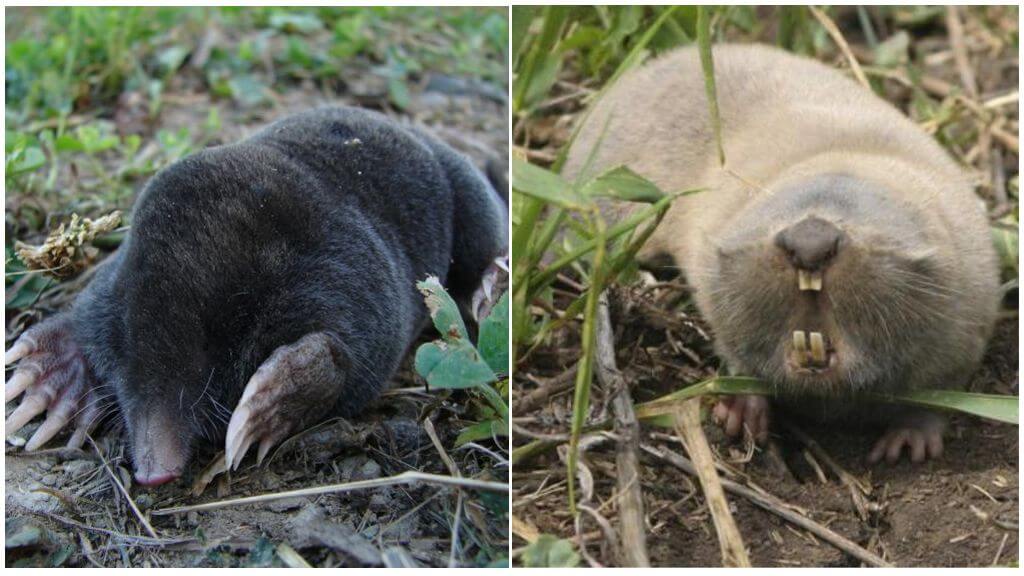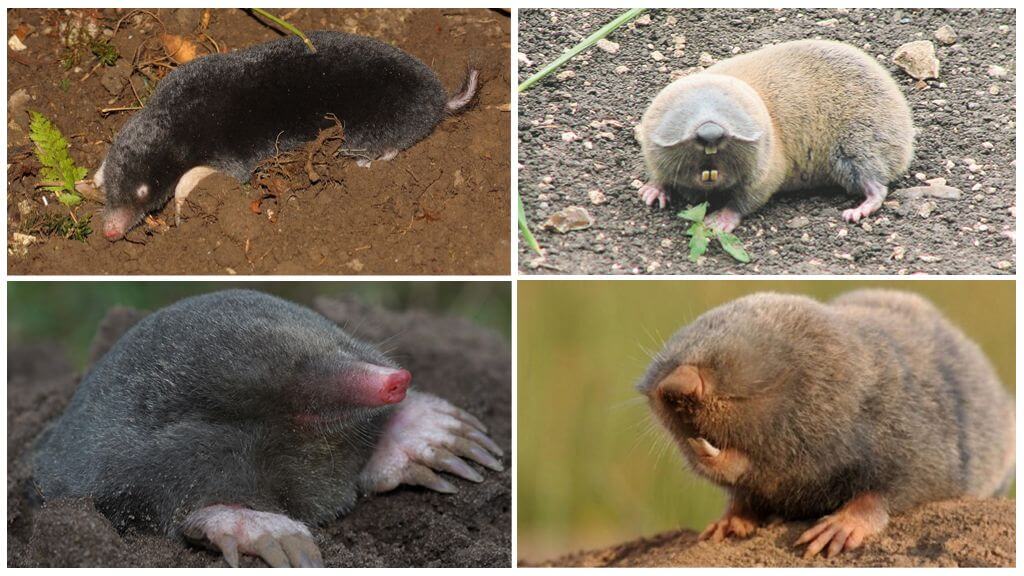What is the difference between a mole and a mole rat?
- Mole and gadfly
- Mole and gadfly
Interspecific differences
The main difference between the two animals is interspecific. Mole belongs to the group of insectivores and is a predator. The length of his body rarely exceeds 20 cm. The streamlined shape of the body allows you to quickly move through narrow tunnels. The excavator spends his entire adult life searching for food. In the daily diet mole The following insects are included:
- earth and earthworms;
- maggots Khrushchev, Zhukov;
- maggots butterflies and other insects.
Underground predator digs its holes with the help of powerful forelimbs, slightly turned outwards. The toes on the legs are equipped with large claws, which animal able to rake large amounts of land. The underground passages of the excavator are located at a depth of 20–25 cm where its favorite food can be found in abundance.
Interesting!
If you compare the appearance of the animals, the photo of the mole of a mole is bypassed in perception, as it looks like a funny little animal with a long nose. Blind because of his large teeth looks more intimidating.
Mole mole rat surpasses its dimensions, especially it concerns a rather rare species - the giant horse ram, whose dimensions can reach 35 cm in length. Blind, or its national name is blind, belongs to the order of rodents and eats only vegetable food. His favorite dishes are:
- sagebrush;
- wheatgrass;
- acorns;
- saplings of maple, oak;
- we swing;
- juzgun
What makes the mole different from a mole rat externally can be seen immediately. Four huge incisors from above and below protrude beyond the limits of the mouth, and they are also the main tool of the excavator. And his limbs are small proportional legs. Like many rodents, they are not strongly developed, unlike the forelimb of a mole.
Blind prefers to dig holes in two tiers. The upper floor is recessed by 20-25 cm, where the roots of the plants are located. The lower tier is designed for nests, storage of food supplies and other rodent needs.
Animal Similarities
Despite the significant differences between the two underground inhabitants, they have much in common. The habitat of animals can intersect in the steppe and forest-steppe zones. Blind prefers dryer sod soils.Moles are found in the forest zone, in lowlands, ravines, where the earth is humid and inhabited by worms.
On a note!
A common sign of these unusual burrow inhabitants is reduced vision. Most of the animals have very small eyes, they are difficult to see among the coat. Some species have lost their organs of vision, which were subsequently prolonged by the skin fold.
The business card of both animals is throwing the earth to the surface while digging tunnels. It is by this action that one can determine where the diggers are found. Their underground activities are striking in their scale. One individual per season makes more than 300 emissions of land, which is several cubic meters of soil. And the length of the tunnels of one animal can reach 350 meters.
Harm and benefits of animals
Any gardener or summer resident will clutch his head if he sees a handful of land on his plot. The presence of a mole or a mole rat on the land is definitely not suitable for a person. But if you figure out the benefits and harms of these animals, you can come to a different conclusion.
On a note!
In the wild, a mole and a mole rat play an important role in biocenoses and the circulation of substances.Their use consists in the constant mixing of the soil, its saturation with oxygen, and the distribution of the seeds of plants.
The mole feeds on insect pests, loosens the soil, mixes layers of the earth. All this has a positive effect on the yield of garden and horticultural crops. The only disadvantage of his activity is the spoiled appearance of the lawn or flower bed. Most often it is for this reason that the landlord is trying fight moles effectively.
Activities of a mole rat in the garden or in the garden have more serious consequences for a person:
- spoiled lawns and flower beds;
- damaged roots of plants and garden trees;
- destruction of root crops (potatoes, beets, carrots);
- damage to bulbs of cultivated plants.
Such a detrimental effect on planting leads to a significant decrease in yield. Land owners have every reason get rid of the rodent on the plot at any price. The general negative attitude towards digging animals is possible and has become the reason why they are often confused.









